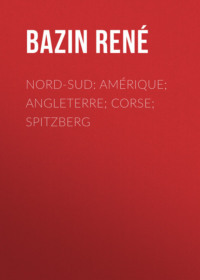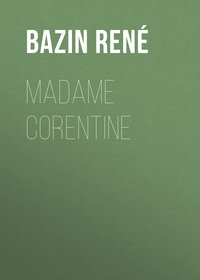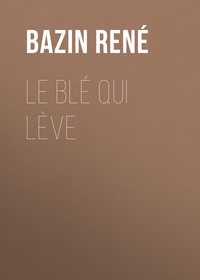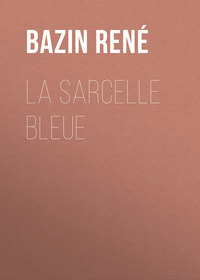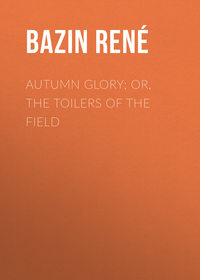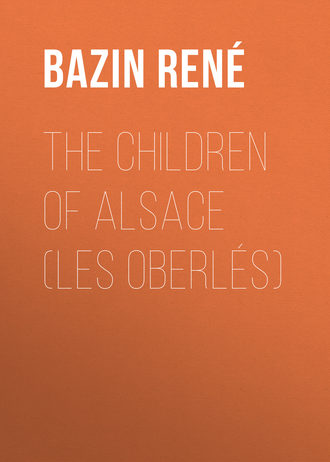 полная версия
полная версияThe Children of Alsace (Les Oberlés)
The pilgrims who had arrived had already made their pilgrimage to the shrine of Sainte Odile, and were hastening to visit the places consecrated by pious or profane tradition: Sainte Odile's well, St. John's well, or by the pagan wall along the goat-path to the Rock of Männelstein, from where there is generally such a lovely view, to the tops of the Bloss and the Elsberg, to the ruined castles which lift their ancient towers among the pines – Andlau, Spesburg, Landsberg, and others. Jean saw the two women cross the courtyard and go towards the chapel. He retraced his steps to the beginning of the wind-swept avenue, along the old building, which reminds one of the advance works of old forts, and passes through a vaulted porch used as an entrance.
Ten minutes later Odile came out of the chapel alone, and guessing that Jean Oberlé was waiting for her elsewhere rather than in this courtyard too full of onlookers, took the road leading to the forest.
She was dressed in the clothes she had worn on Maundy Thursday, the same dark dress, but her hat was very simple, very youthful, and suited her to perfection: a straw, with a wide brim turned up on one side, and trimmed with a twist of tulle. She carried a summer jacket on her arm, and a sunshade. Odile walked quickly, with her head slightly bent, as those walk who are not interested in the road, or who are either praying or dreaming. When she came near Jean, who was on the right of the portico, she looked up, and said without stopping:
"The woman who came with me is resting. Here I am!"
"It is good of you to have trusted me!" said Jean. "Come, Odile!"
He followed, close to her, the avenue planted with sorry trees distorted by the winter winds. He was so much affected by the realisation of his dream that he could only think and speak of one thing: his gratitude to Odile, who was absolutely silent, only listening to what he did not say – and as full of emotion as he was.
They left the road at the place where it begins to slope downwards, and took a path through the forest of lofty pines in serried ranks which leads round the convent. There was no one there, and Jean saw that Odile's eyes of the colour of ripe corn, eyes deep and serious, were turned towards him. There was no sound in the wood save that from the drops of moisture falling from the leaves. They were quite close to each other.
"I asked you to come," said Jean, "so that you should decide what my life is to be. You were the love of my early youth. I want you to be my love always!"
Odile's look was far away, lost in the distance. She trembled slightly, and said:
"Have you thought?"
"Of everything!"
"Even of that which may separate us?"
"What do you mean by that? What are you afraid of? Of entering a disunited family?"
"No!"
"You would bring them together, I am sure of it. You would be its joy and peace. What do you fear – my father's or your father's opposition because they are now enemies?"
"That could be got over," said the young girl.
"Then it is because your mother detests me," said Jean hastily. "She does hate me, does she not? The other day she was so stiff to me, so offensive."
The fair head made a sign of denial.
"She will be slower in believing in you than my father was, slower than I was myself. But when she sees that your education has not changed your mind towards Alsace she will overcome her prejudices."
After a moment's silence Odile said:
"I do not think I am making any mistake. To-day's difficulties can be brushed on one side by you or by me, or by both of us. I am only afraid of what I do not know, the least thing which to-morrow might aggravate such a disturbed state – "
"I understand," said Jean, "you are afraid of my father's ambition?"
"Perhaps!"
"We have already suffered much from that. But he is my father. He is set on keeping me here; he says it every day. When he knows that I have chosen you, Odile, if he has personal projects which would prevent our marriage, he will at least put them off. Do not have any fear; we shall win!"
"We shall win!" she repeated.
"I am sure of it, Odile. You will make my life, Odile, which will be difficult, perhaps impossible, if you were not there. It was for you that I came back to the country. If I tell you that I have travelled much, and found no woman who had the charm for me that you have, or who made the same impression on me – how shall I tell you? The impression of a mountain stream so fresh and deep! Every time I think of my future marriage your image comes before my eyes. I love you, Odile!"
He took Odile's hand, and she answered, lifting her eyes to the light coming from above the trees.
"God is my witness that I love you, too!"
She thrilled with joy, and Jean felt her hand tremble.
"Yes," said Jean; and he tried to look into her eyes, which were still fixed on the distance.
"We shall overcome everything. We shall overcome the numerous obstacles arising from this terrible subject: that is all that is between us."
"Yes; it is the one and only question in this part of the world."
"It poisons everything!"
She stopped, and turned her radiant face full of love to him – of that beautiful and proud love which he had longed to know and to inspire.
"Say rather that it makes everything greater. Our quarrels here are not village quarrels – we are either for or against a country. We are obliged to have courage every day, to make enemies every day, every day to break with old friends who would willingly have remained faithful to us, but who are not faithful to Alsace. No action of our lives is indifferent; there is no action that is not an affirmation. I assure you, Jean, there is nobleness in that."
"That is true, Odile, my beloved."
They stopped to enjoy that delicious word to the full. Their souls were in their eyes, and they looked at each other tremblingly. In low tones, although there were no onlookers other than the pines swayed by the wind, they spoke of the future as of a battle already begun.
"Lucienne will be on my side," said Jean. "I shall entrust my secret to her when occasion occurs. She will help me, and I count on her."
"I count on my father," said Odile; "for he is already well disposed towards you. But take care not to do anything that would annoy him. Do not try to see me at Alsheim. Do not try to hurry on the time."
"That glorious time when you will be mine!"
They smiled at each other for the first time.
"I love you so dearly," continued Jean, "that I shall not ask you for the kiss that you would no doubt give me – I have no right to it. We do not entirely depend on ourselves, Odile. And then it pleases me to show you how sacred you are to me. Tell me at least that I shall take away with me a little of your soul?"
The lips so near his murmured "Yes!" And almost immediately:
"Do you hear down there? Is that the first Easter bell?"
They turned together towards the side where the wood sloped downwards.
"No; it must be the wind in the trees."
"Come," said she: "the bells are going to ring. And if I were not seen up there when they rang, old Rose would speak of it…"
Hardly saying a word, she led him to the base of the rock. There they separated to go back to the Abbey by two different paths.
"I shall find you again on the terrace," said Odile.
The daylight was growing blue in the hollows. That was the hour when waiting for the night does not seem long, and the morrow already dawns in the dreaming mind.
In a few minutes Jean had crossed the yard, followed the corridors of the convent, and opened a door leading to the garden in a sharp angle at the east of the buildings. There it was that all the pilgrims to Sainte Odile met to see Alsace when the weather was clear. A wall, high enough to lean on, runs along the top of an enormous block of rock, advancing like a spur above the forest. It overlooks the pines which cover the slopes everywhere. From the extreme point shut in, like the lantern of a lighthouse, one can see to the right quite a group of mountains, and in front and to the left the plain of Alsace. At this moment the fog was divided into two parts, for the sun was shining on the peaks of the Vosges. All the cloudy mist which did not reach that waving line of peaks, was grey and wan; but just above, almost horizontal rays pierced the mist and coloured it, giving to the second half of the landscape a look of brightness like luminous foam. And this separation showed with what quickness the mist came up from the valley towards the departing sun. The fleecy clouds intermingling, were wafted into the illumined space, were irradiated, showing thus their incessantly changing shapes, and the strength of the motion impelling them, as if the light had summoned their columns to greater heights.
There was at the entrance of this narrow place, arranged for pilgrims and visitors, an old man wearing the costume of the old Alsatians to the north of Strasburg; near him the priest with grey curly hair whom the children had greeted in the morning on the slope of Sainte Odile; a step or two farther on were the young Weissenburg peasants, and at the narrowest spot, squeezed close together on the wall, were the two students who might have been taken for brothers on account of their protruding lips and their beards divided in the middle, one fair, the other chestnut coloured. Both were Alsatians. They exchanged everyday remarks, as is usual among people who do not know each other. When they saw Jean Oberlé they turned round, and they felt themselves suddenly united by a common bond of race which becomes stronger in the face of a common danger.
"Is he a German – that one there?" asked a voice.
The old man who was near the priest cast a glance in the direction of the garden and answered:
"No; he wears his moustache in the French fashion and he looks like one of us."
"I saw him walking with Mademoiselle Odile Bastian, of Alsheim," said the young woman.
The group was reassured, and more so when Jean greeted the priest in Alsatian and asked:
"Are the bells of Alsace late?"
They all smiled, not because of what he had said, but because they felt at home among themselves without an inconvenient witness.
Odile came in her turn and leaned against a wall on the right of the first group. Jean took up a similar position on the other side of the group. They were suffering from loving so much, from having said it, and from only being sure of themselves.
The bells were not late. Their voices were encircled and enclosed by the rising mists. Suddenly they escaped from the cloudy masses, and it seemed as if each separate morsel of fog burst like a bubble on touching the wall and poured out on the summit of the sacred mountain all the harmony of the pealing bells. "Easter! Easter! The Lord is risen! He has changed the world and delivered men! The heavens are opened!" So sang the bells of Alsace. They were ringing from the foot of the mountain, and from the distance, and from far, far away, voices of the little bells, and voices of the great bells of cathedrals; voices which never ceased and from peal to peal were prolonged in re-echoing reverberations; voices that passed away lightly, intermittently, delicately, like a shuttle in a loom; a prodigious choir, whose singers were never visible to each other; cries of joy from a whole population of churches, songs of the spring eternal, which rose up from the depths of the misty plain and mounted to the summit of Sainte Odile to blend into one harmonious whole.
The grandeur of this concert of pealing bells silenced the few folk gathered together up there. The very air prayed. Souls thought of the risen Christ. Several thought of Alsace.
"There is some blue sky," said a voice.
"Some blue up there," repeated a woman's voice, as if in a dream.
They scarcely heard it, in the roar of sounds which rose from the valley. Yet all eyes were raised at once. They saw in the sky, amidst the masses of fog fleeing before the assailing sun, blue depths opening and opening with bewildering rapidity. And when they again looked downwards they perceived that the cloud of mist also was tearing itself to pieces on the slopes. It was the clearing up. Parts of the forest slipped, as it were, into the divisions made in the moving fog; then others; then black crevasses, the thickets, and rocks; then of a sudden the last rags of mist, drawn, thin, contorted, lamentable, went up in whirling masses, brushed against the terrace, and disappeared above. And the plain of Alsace appeared all blue and gold.
One of those who saw it cried out:
"How beautiful!"
All leaned forward to see in the opening of the mountain the plain growing lighter and lighter as far as eye could see.
All these Alsatian souls were touched. Three hundred villages of their own country lay below them scattered about amidst the young green of the cornfields. They were sleeping to the sound of the bells. Each was only a rose-red spot. The river, near the horizon, showed like a bar of dusky silver. And beyond rose stretches of country, whose shape was vanishing rapidly in the fogs which still hung above the Rhine. Quite near by, following the slope of the fir plantations, one saw, on the contrary, the smallest details of the forest of Sainte Odile. Several points of dark green jutted out into the valley and mixed with the pale green of the meadows. All was lit up by reflection from a sky full of rays of light. No bright spot attracted the eye. As the bells had united their voices, so the varying shades of the earth had melted into a harmonious unity. The old Alsatian, who kept his place at the side of the priest, stretched his arms, and said:
"I hear the cathedral bells."
He pointed, away in the distance over the flat country, to the celebrated spire of Strasburg, which looked like an amethyst the size of a thumbnail. Now that they could see the rose-red of villages, they imagined they could recognise the sound of the bells.
A voice said: "I recognise the sound of the bells of the Abbey of Marmoutier. How well they chime!"
"I," said another, "I hear the bells of Obernai!"
"And I the bells of Heiligenstein."
The peasant, who came from the neighbourhood of Weissenburg, also said:
"We are too far off to hear what the bells of Saint George of Haguenau are ringing. However, listen, listen; there – now."
The old Alsatian repeated seriously:
"I hear the cathedral!" and he added: "Look up there again!"
They could all see that the clouds had ascended to the regions of the sunbeams. The cloud, shapeless at the base of the mountain, had spread across the sky, and was like sheaves of gladioli thrown above the Vosges and the plain: some red, like blood, some quite pale, and some like molten gold. And all those witnesses looking up from between the two abysses, their gaze having followed the long light line, remarked that it lit up the earth with its reflection, and that the distant houses of the capital and the spire of the cathedral stood out in a tawny light from the thickening shadow.
"That is like what I saw on the night of August the 23rd, 1870," said the old Alsatian. "I was just here – "
They, even the very young ones, had heard this date frequently spoken of. Their looks were fixed more steadily on the little spire, whence came still a little shining light and the sound of the resurrection bells.
"I was here with the women and girls from yonder villages, who had come up here because the noise of the cannons had redoubled. We heard the cannons as we now hear the bells. The bombs burst like rockets. Our women were weeping here where you stand. That was the night when the library caught fire, that the new church caught fire, and the picture gallery, and ten houses in Broglie. Then a yellow-and-red smoke rose, and the clouds looked like these we now see. Strasburg was burning. They had fired one hundred and ninety-three shells against the city.
One of the students, the younger one, shook his fist.
"Down with them!" muttered the other.
The peasant took his cap off and kept it under his arm, without saying a word.
The bells were still ringing, but not so many of them. They could no longer hear the bells of Obernai, nor of Saint Nabor, nor some of the others they thought they had heard. They were like lights going out. Night was coming.
Jean saw that the two women were almost weeping, and that every one was silent.
"Please say one prayer for Alsace," he said to the priest, "while the bells are still ringing for the resurrection."
"Right! that's right, my boy!" said the old peasant standing by the priest; "you belong to the country!"
The heavy, weary face of the priest brightened at the same time. His voice, which was slightly broken, was not steady. An old and enduring sorrow, yet always new, spoke through his lips, and while they were all looking, as he was himself, towards Strasburg, the city which night was hiding, he prayed:
"My God, here, now we can see from your Sainte Odile nearly all the beloved land, our towns, our villages, and our fields. But some of our land lies also on the other side of the mountains, and yet that is also our country. You permitted us to be separated. My heart breaks to think of it. For on the other side of the mountains is the nation we love, and which you still love. It is the oldest of the Christian nations; it is the nearest to Godlike things. It has more angels in its skies because it has more churches and chapels on earth, more holy tombs to defend, more sacred dust mixed with its fields, with its grass, with the waters which permeate the land and nourish it. Oh God, we have suffered in our bodies, in our goods; we still suffer in our memories. Nevertheless, make our memories last. Grant that France also will not forget. Make her more worthy to lead nations. Give her back her lost sister, who may also return. Amen!"
"As the Easter bells return."
"Amen!" said the voices of two men.
"Amen! Amen!"
The others wept in silence. There was only the hollow sound of one single bell in the cold air that came up from the depths. The ringers had left the towers, already lost in the shadow that covered the plain.
Above the high platform in the garden the darkened clouds, flying to the west, left a border of purple on the crest of the mountains. Stars came out, in the black depths of the night, as the first primroses were coming out, at the same time under the pines. Only three persons were left on the terrace. The others had gone when the secret of their Alsatian souls had been revealed.
The old priest, seeing before him two young people close to each other, and Odile's head near Jean's shoulder, asked:
"Betrothed?"
"Alas!" answered Jean. "Wish that it may become true."
"I do wish it. What you just said is right. I wish that you, who are young, may see Alsace once more French."
He went away.
"Good-bye," said Odile quickly, "Good-bye, Jean!"
She held out her hand, and went away without turning to look back. Jean remained near the terrace wall.
The night birds – owls, sea-eagles, eagle-owls, and horned owls – mingling their cries, flew from wood to wood. For a quarter of an hour, the time of their passage, which they made in sweeping flights, their calls resounded over the mountain sides. Then complete silence settled down. Peace arose with the perfumes of the sleeping forests.
CHAPTER VIII
AT CAROLIS
At the beginning of the rue de Zurich, facing the Quay des Bateliers, one of the relics of old Strasburg, there is a narrow house, much lower than its neighbours, with a roof of two stories like a Chinese pagoda. The front, formerly adorned with the pattern of its painted beams, is now covered with whitewash, on which is this inscription:
"JEAN, CALLED CAROLIS, WEINSTUBE."This wine-shop, whose exterior has nothing about it to arouse the curiosity of the passer-by, is not a nondescript place, nor is it an ordinary public-house. The place is historical. The inhabitants of Zurich came here in 1576, or, at least, the best shots among them, to take part in the grand shooting competition to which Strasburg had summoned the Empire and the confederated States. They had brought with them a pot of boiled millet, and scarcely were they out of the boat than they made the Strasburg people understand that the pudding was still warm.
"We could easily come to your aid, neighbours," they said; "by the Rhine and the Ill, the distance between our cities is very short." The word given in 1576 was kept in 1870, as is testified to by an engraved inscription just near by on the Zurich Fountain. At the moment when besieged Strasburg was in the most distressed condition the people of Zurich intervened, and obtained from General Werder permission to allow the old men and children to leave the city. This house was noted for something else – thanks to the Southerner who in 1860 established a shop there for wines of the South.
Jean, called Carolis, bore a remarkable resemblance to Gambetta. He knew him, and copied his gestures and his clothes, the cut of his beard, and the sound of his voice. His trade was fairly flourishing before the war, but he became prosperous in the years that followed. And a certain number of German officers got into the habit of coming there to drink the black wines of Narbonne, Cette, and Montpellier.
One morning towards the end of April, Jean Oberlé, who was going to see the Chief of the Administration of Forests, whom he had long promised to visit, was passing along the quay, when a woman of about forty, clothed in black, evidently an Alsatian, came out of the café, crossed the road, and, apologising, said:
"Pardon me, monsieur, but will you kindly come in? One of your friends is asking for you."
"Who is it?" asked Jean, astonished.
"The youngest officer there."
She pointed with her finger to the confused mass of shadow moving under the lowered linen blind, and which he saw to be the inside of the room with its groups of customers.
Jean, after hesitating for a moment, followed her, and was surprised – for not belonging to Strasburg, he was ignorant of the reputation and also of the customers of this wine-shop – at finding there six officers, three of whom were Hussars, seated at tables covered with red and blue check cloths, talking loudly, smoking, and drinking Carolis wine.
The first glance he gave, on coming from the light into the semi-darkness, showed him that the room was small – there were only four tables – and decorated with allegorical pictures in the German style; he saw a monkey, a cat, a pack of cards, a packet of cigarettes, but above all there was a semi-circular mirror filling a recess in the left wall and round which hung framed photographs of the present or past habitués of the house. Jean looked again to see who could have sent for him, when a very young cavalryman got up. This simple movement displayed the beauty of his slender form in its sky-blue tunic with gold lace. He rose from the back of the room to the left. Near him, and round the same table, a captain and a commandant remained seated.
The three officers must have returned from a long march; they were covered with dust, their foreheads were wet with perspiration, their features were drawn, and the veins stood out on their temples. The youngest had even brought back from this country ride a branch of hawthorn, which he had slipped under his flat epaulet, on the side near the heart.
The Alsatian recognised Lieutenant Wilhelm von Farnow, a Prussian, three years older than himself, whom he had met before during his first year's law course in Munich, where Farnow was then sub-lieutenant in a regiment of Bavarian Uhlans. Since then he had not seen him. He only knew that in consequence of an altercation between Bavarian and Prussian officers in the regimental casino, some of the officers implicated had been removed, and that his old comrade was among their number.
No; doubt was not possible. It was Farnow, with the same elegant, haughty way of offering his hand, the same fair, beardless face, too thick-set and too flat, with thick lips, an impertinent little nose, slightly turned up, and fine eyes of steel-blue – a hard blue where dwelt the pride of youth, of command, of a bold and disputatious temper. His body gave promise of developing into that of a solid and massive cuirassier later on. But at present he was still thin, and so well-proportioned, so agile, so evidently inured to warlike exercises, so vigorous, there was such disciplined precision in all his movements, that de Farnow, although he had not a handsome face, had gained a reputation for good looks, so much so that in Munich one would call him sometimes "Beauty" Farnow, and sometimes "Death's Head" Farnow. With reddish moustaches, bushy brows, and a helmet accentuating the shadow over his eyes, he would have been terrifying. But, though scarcely twenty-seven, he gave the impression of a warlike being, violent, conqueror of himself, disciplined even to his acquired and perfectly polished manners.




